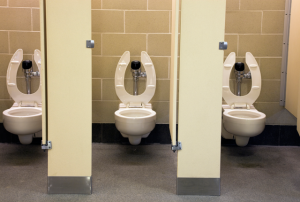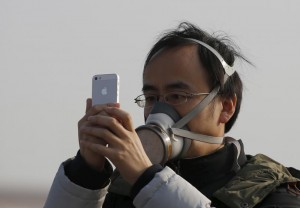A lot of us may have heard that drinking water while you are eating can increase your weight. However, this has been confirmed by many studies to be untrue. One reason that some people believe drinking water while eating can increase weight is that it can fill up the stomach, which will cause the stomach to get bigger. However, many believe that this is not the case. Many studies have suggested that drinking water while or before eating can cause weight loss, according to this article, drinking water before or while eating can help satisfy our hunger and thus cause us to consume less food. However, the article I found did not mention If it is better to drink cold or warm water while eating to maximize benefits. So, I decided to do a research into this topic and look for any experiments that tested this hypothesis to know whether or not there is a difference in drinking either cold or warm water while eating.

Image found here
Alternative Hypothesis: Drinking cold water while eating is better than warm water for your body.
Null Hypothesis: Drinking cold water while eating has the same effects on your body as when drinking warm water.
According to an article in Collective Evolution, drinking water while eating can be helpful in speeding up your metabolism. However, this is not necessarily always true. The article says that drinking cold water while eating can actually have negative effects by making your body consume more energy than when not drinking water at all. The hypothesized causation is that cold water takes more time to be warmed inside your stomach than warm water does. Not to mention that this wasted energy that your body uses to heat cold water should be used for digestion, which could cause weight gain. The hypothesized mechanism is: as the body consumes too much energy in heating the cold water, the digestion system becomes less efficient, which will prevent your body from assimilating food and getting rid of waste and thus cause weight gain. Therefore, the article says that it is better to drink warm water while eating than to drink cold water.
I think that the conclusion that the article reached is very convincing because the article has provided a mechanism for the process. However, the article did not mention enough detail on how the studies, which the article’s conclusion was based on, were done, nor it mentioned the results of other meta-analysis studies that were done on the hypothesis. This could indicate that the results the article came up with could suffer the File Drawer Problem.
Fortunately, I found a study done in 2009 that done an experiment on the effects of cold meals the body digestion system. While it is right that the study does study the exact hypothesis that I mentioned in the post, the study examines the effects of meals of different temperature on the digestion system, which could have similar effects on the body to what cold water does.
The study tested 25 participants, most were males, and gave them three different liquid or solid meals, each with a different temperature. The study measured the efficiency of the digestion system for each meal by measuring the gastric emptying each time participants were given a meal.
The study used a control trial to test the hypothesis, which is, as we learned in class, a method that can provide reliable results. Furthermore, I think that the study could not use the placebo effect because participants can recognize cold meals from hot meals. In addition, the study did not provide any mechanism for the hypothesis being tested nor it provided detail on the exact results, which could help us learn how significant the difference in the digestion system efficiency when the participants were given meals of extreme temperatures and when they were given meals of the room (warm) temperature. The study has also tested a small number of people, which could increase the risk of getting false positive results or due to chance. Not to mention that the participants in the study were 22 males and 3 females. This could result in inaccurate results, as the digestion system in males’ body might be different than that of females.
The study found that when participants were given meals of temperatures more extreme than the body’s typical temperature, their body took more time to digest that meal. Similarly, the hypothesized relationship between cold water and the time the body needs to heat it, suggests that the colder the water is, the more energy the body will need to consumed and time the spent in the process in order to heat it. This correlation, in my view, makes perfect sense to why drinking warm water is better than drinking cold water while eating. However, I still need to be skeptical about the results, so I decided to look for the results of other studies.

Image found HERE
I found another two studies that also test the same hypothesis and came up with the same reults as the previous study did. One study that was done in 1988 found that gastric emptying in the participants’ bodies was less efficient when the participants were given cold liquids. The study also found the hot food, but not extremely hot, took less time in the digestion system than warm food did. The other study, done in 1998, found that liquid meals that have temperatures that are either colder or warmer than the body’s temperature can cause the body to consume more energy and time to digest them.
In addition, I found a study that was done in 1989 the came with a different result than the other studies I mentioned in the post. It found that the temperature of the food people eat has no difference on the digestion system. However, the study results might have a greater chance to be due to chance, because the study has tested many variables such as gastric acid secretion, gastrin release, and gastric emptying, which could cause the study to suffer from the Texas Shooter Problem.
Bottom Line: there are not a lot of studies that did experiments on the hypothesis being tested; however, many meta-analysis studies that had tested similar hypotheses provided good evidence for me to believe that it is better for me to drink warm water than cold water while eating. Furthermore, there are many articles that support the hypothesis that drinking warm water while eating is better than drinking cold water, even though they did not provide evidence for experiments, they did provide a convincing mechanism for the hypothesis. In addition, while it is true that drinking warm water while eating can help you lose weight, drinking cold water has appeared to have less effects on weight loss than the effects that warm water has on your body, such as weight loss, because drinking cold water while eating body causes your body to consume the energy that your body should be using for digestion and therefore, have less energy available to consume for the digestion system.









 haze. So, can haze cause seasonal affective disorder, and then induce suicide? Vice professor Jie Zhong in Psychology of Peking University said that although melatonin levels are related to depression, this kind of influence usually exist in the high latitude regions having polar daylight and polar night, such as Russia, Norway and Denmark. Therefore, he said that haze is just an excuse for depression. From my perspective, this conclusion has no any evidence or experiment to support, so it is not convincing.
haze. So, can haze cause seasonal affective disorder, and then induce suicide? Vice professor Jie Zhong in Psychology of Peking University said that although melatonin levels are related to depression, this kind of influence usually exist in the high latitude regions having polar daylight and polar night, such as Russia, Norway and Denmark. Therefore, he said that haze is just an excuse for depression. From my perspective, this conclusion has no any evidence or experiment to support, so it is not convincing.